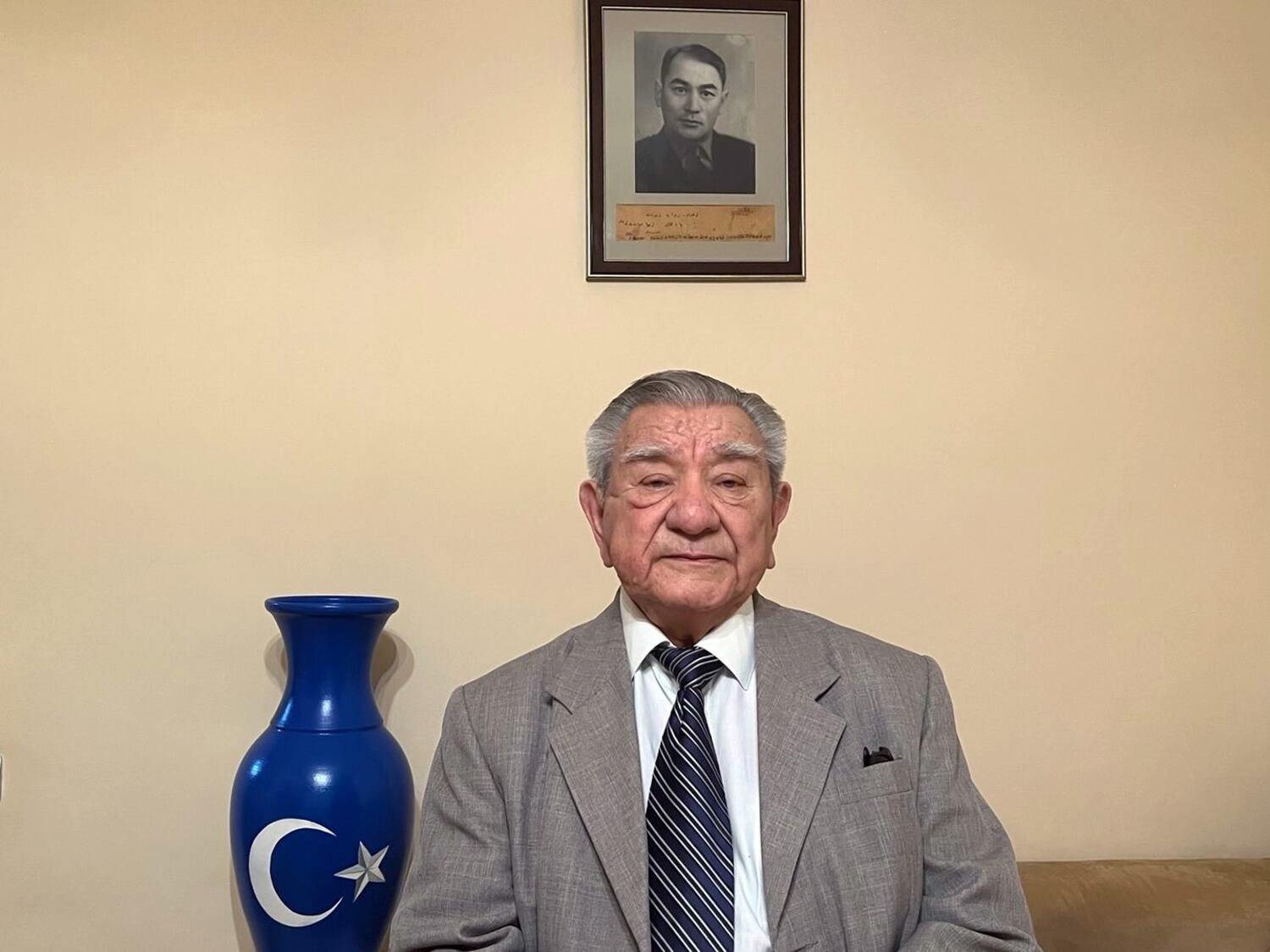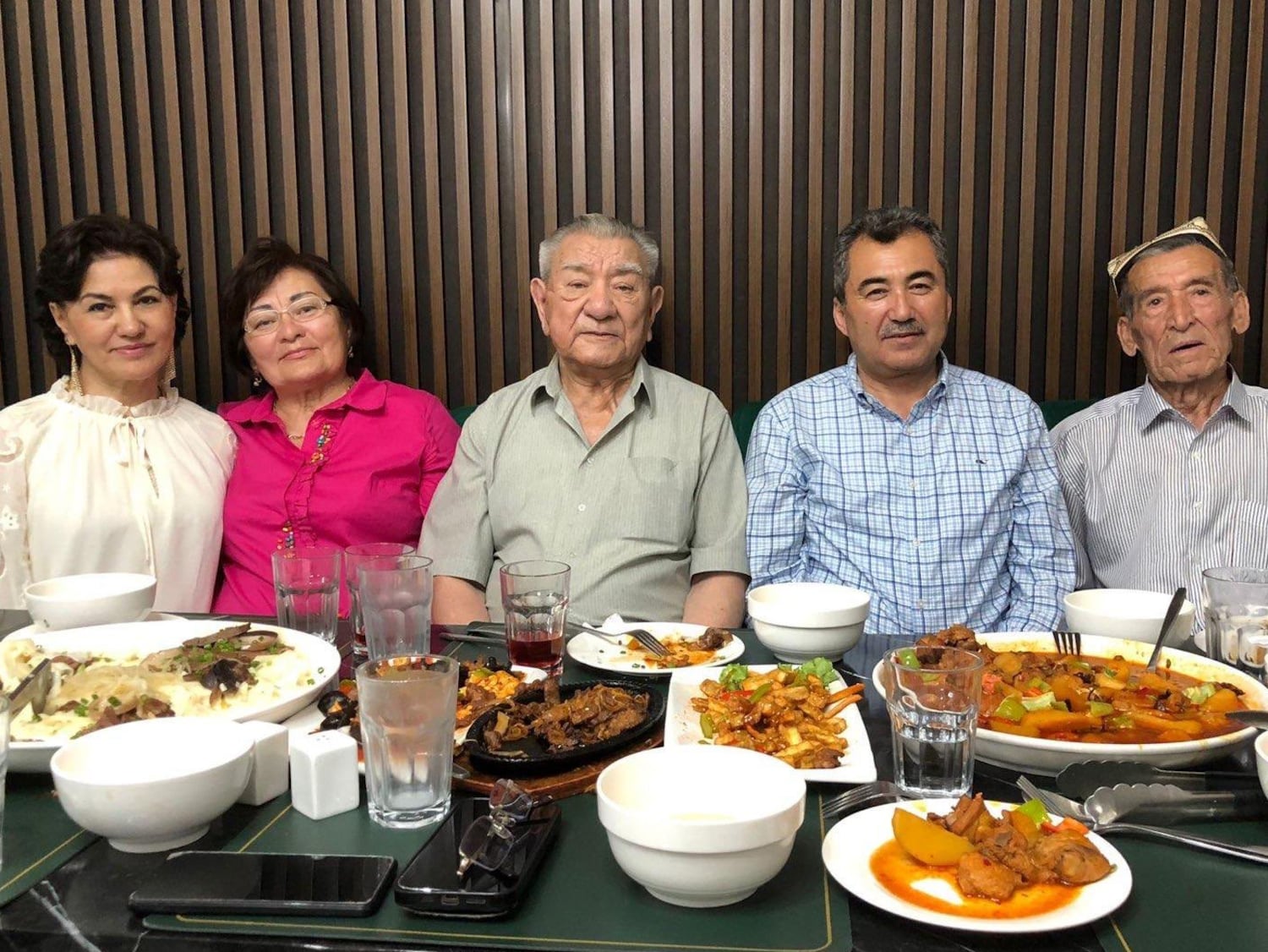Respected Uyghur journalist, community leader in Kazakhstan dies
Riza Samedi, who died in December 2024, is remembered as an influential leader in the Uyghur diaspora.

Read RFA coverage of this story in Uyghur.
Uyghurs in Kazakhstan bade farewell to Riza Samedi, a journalist, Uyghur nationalist and influential community leader who died from an illness on Dec. 29 at age 86.
Samedi, also known as Riza Samed, was a prominent figure in the Uyghur resurgence and independence movements of the late 20th century in Kazakhstan and internationally.
Uyghurs and Kazakhs alike recalled Samedi with great respect.
Dolkun Isa, former president of the World Uyghur Congress, an advocacy group, said Samedi was a national leader of the Uyghur people.
“He was someone who had witnessed the birth of the East Turkestan Republic in 1944 and enjoyed living in our independent country,” Isa said. “Not only did he taste the joy of our independence, but he also suffered under [Chinese] colonization.”
“He became our leader and educator in passing the spirit of independence to the next generation after fleeing into Central Asia with the family,” he said.
East Turkestan is the Uyghurs' preferred name for their homeland, which was absorbed by China in 1949 and today is known as the Xinjiang Uyghur Autonomous Region. There were two short-lived independent East Turkestan republics, from 1933-34 and again from 1944-49.

During a funeral prayer service in Kazakhstan’s capital Almaty, Azad Ibrahimov, head of the city’s Auezov district, told mourners that Samedi made great contributions to the development of Uyghur national media and the Uyghur nationalist movement by exposing China’s atrocities against the mostly Muslim group.
“The names of national heroes like Riza Samedi will never be forgotten in the hearts of the Uyghurs,” he said.
Son of a colonel
Born in 1938 in Ghulja, or Yining in Chinese, Samedi was the eldest son of Ziya Samedi, a prominent writer and a colonel in the East Turkestan armed forces during a period of rebellion against the Chinese government in the mid-20th century.
After China took over East Turkestan, Ziya Samedi fell victim to a purge of “local nationalists” in 1957 and 1958 and spent a year in a forced labor camp. He later fled with his family to Soviet Kazakhstan in 1961 during a period of heightened tension between China and the Soviet Union.
Riza Samedi worked as a middle-school teacher in Ghulja. After moving to Almaty, he taught for a couple of years and then worked in Uyghur-language TV and radio broadcasting in the Kazakhstan and Uzbekistan Soviet republics until 1968, according to his sister, Beliqiz Samedi.
During the next two decades, Samedi worked as a journalist in the Uyghur service at the State Committee of Television and Radio Broadcasting of the Soviet Union in Moscow.
He also was a member of the Union of Journalists of Kazakhstan and had served as an advisor to the World Uyghur Congress.
After Samedi retired in 2002, he devoted himself to serving the estimated 2 million Uyghurs who live in Kazakhstan, advocating for Uyghur rights and the preservation of Uyghur culture in the diaspora.
Beliqiz Samedi recalled that her brother followed in the footsteps of their late father through his work to preserve the Uyghur people’s national identity.

She said he would often discuss the Uyghur cause and expressed hope about young Uyghurs who lived and studied in Europe and the United States.
“My brother worked in good places and did a lot of work,” she told Radio Free Asia.
‘That day shall come’
Abdulhakim Idris, executive director of the Center for Uyghur Studies, a Washington-based think tank, interviewed Samedi during a visit to Kazakhstan in June 2024.
“He was always proud of the young people advocating for Uyghurs on the international stage,” Idris recalled.
Samedi told him that he encouraged other Uyghurs, especially the young, to never lose hope that the world would rally to the Uyghur cause and gain a renewed understanding of Uyghurs once they formed an independent nation.
“That day shall come,” Samedi said during the interview. “Therefore, let’s all live with prayer and hope each day knowing that our homeland will be free today or tomorrow.”
Samedi was active in various groups that advocated in Kazakhstan and other Central Asia countries for a Uyghur homeland, said Kahriman Ghojamberdi, a political analyst and historian who is chief advisor to the World Uyghur Congress.
“Since Riza grew up in East Turkestan and went to college, he understood the cause to free our homeland well,” Ghojamberdi said. “We learned a lot from him. Therefore, I paid close attention to his opinions.”
Samedi also organized numerous interviews on Uyghur advocacy topics as a reporter for Kazakhstani radio, he said.
Abdugopur Kutlukov, Kazakhstan’s honorary writer and a famous poet, said with Samedi’s death, Uyghurs had lost a distinguished individual.
Deeply affected by his passing, Kutlukov, also born in Ghulja, wrote a poem about Samedi:
Goodbye, my friend Riza, I’ve lost you,
As though I’ve lost a wing,
We’re scattered across the world like threads,
Is this why we’re born, to feel such sting?
Tell me, who cries, if not me?
The sorrow won’t release its hold,
My cries don’t reach God’s ears,
No one hears the pain I’ve told.
No one cares for the refugees’ plight,
Each day becomes a harder fight.
Tell me, who cries, if not me?
Our elders leave, one by one,
While the rest of us are lost,
Wandering beneath a fading sun.
In our homeland, they struggle each day,
Shot down while seeking love their way.
Tell me, who cries, if not me?
Translated by Alim Seytoff for RFA Uyghur. Edited by Roseanne Gerin and Malcolm Foster.
This article has been sourced from various publicly available news platforms around the world. All intellectual property rights remain with the original publishers and authors. Unshared News does not claim ownership of the content and provides it solely for informational and educational purposes voluntarily. If you are the rightful owner and believe this content has been used improperly, please contact us for prompt removal or correction.








.jpg?Expires=1840063712&Key-Pair-Id=K2ZIVPTIP2VGHC&Signature=prWKBuGOVPmxZV7qoieG82omfyfXLNLusQT5Typ4zbMnoLIV6aiHAlN7iIgnSQp7xaSGOza-LcWjBiNPZDRz884yMYhfYFJPGW3lPk94WXQ0C2p~NrXnLe8ypnvUYOYMiw5cUswprSqc3-vUFFMbO5N8Mu4No3MYVkmEWCCQaOHFLTFfT4L~7G1xSV-9HrO~bvVUMcUmXa-vI526wCAwk8VWY4L1LP6s3I9dXbWUPkugoUGSCjCieR5bV2BffWCZdF0ZjYPdP8PdWTKG3Jygrdnv28XnOZp2JLgoTpLEopEJvOTe9U8PFoo1ZQTwGah4Y9ecfNUWhIa~oiprqjEXzA__)



